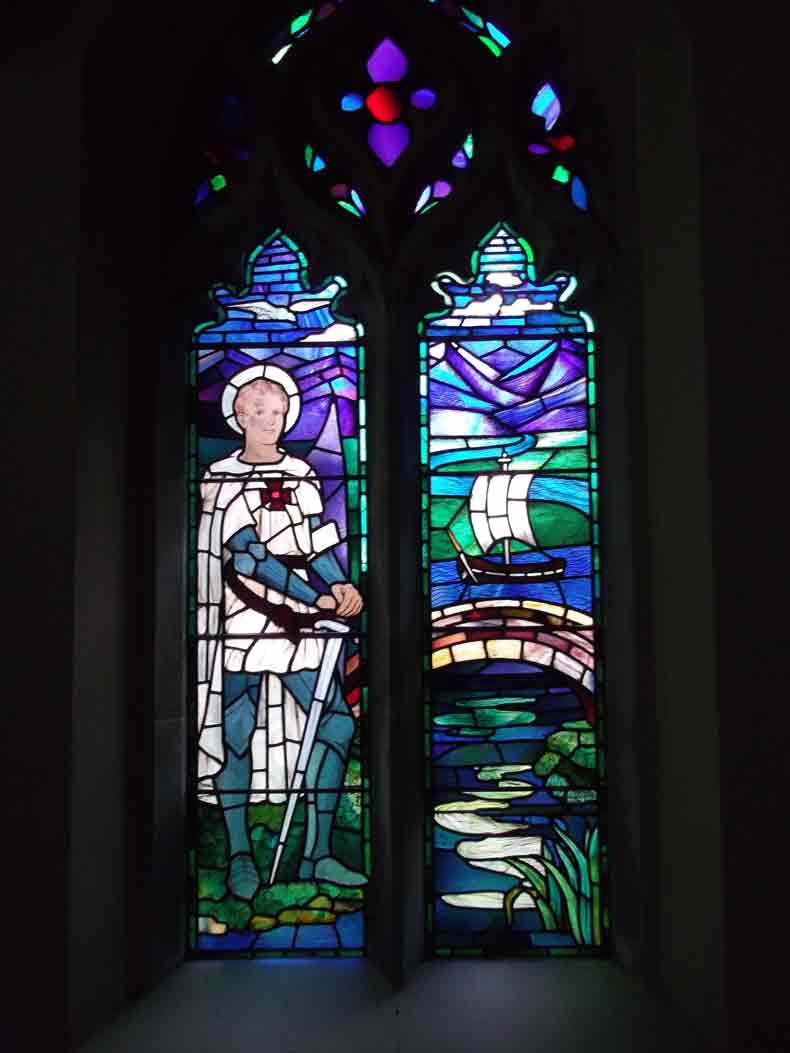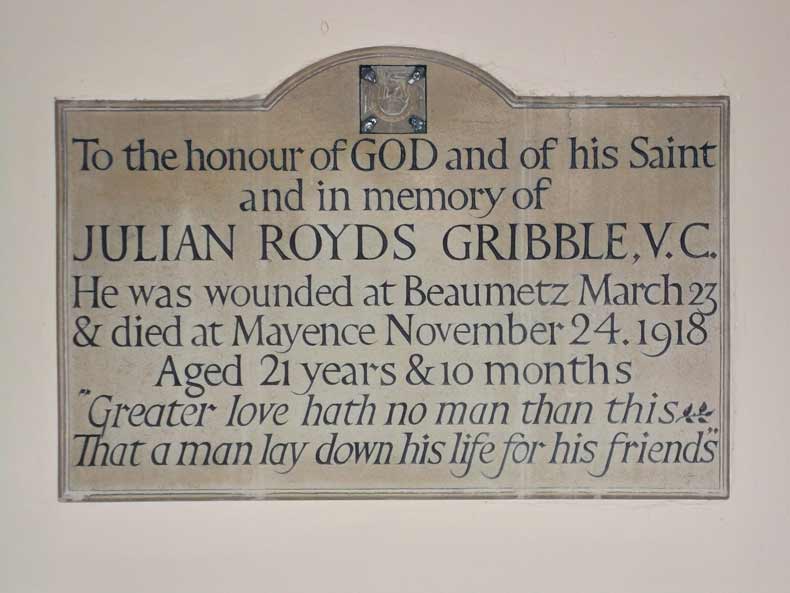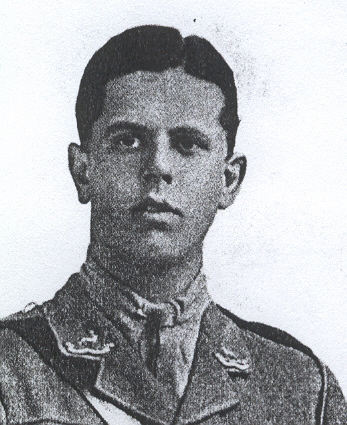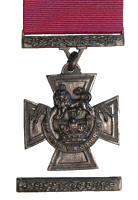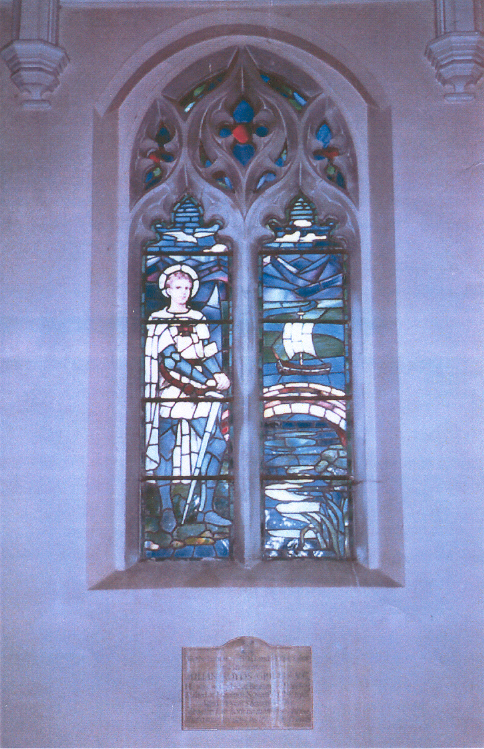T/CAPTAIN JULIAN ROYDS GRIBBLE
In the Church at Long Bredy there is a brass tablet fixed to a column to commemorate those who gave their lives in the two World Wars and one name is that of the soldier above, Julian Gribble.
What connection has Julian with the Bride Valley and why in Long Bredy Church?
The connection is- Kingston Russell House which stands in the Parish of Long Bredy. In 1913 the house was virtually in ruins and a Mr. George Gribble, Julian's father, acquired it from the Bedford Estate and set about the restoration. He made the present approach road to the house in 1914 and added wings to the North and South of the East elevation. The east wing was demolished. George James Gribble a merchant was married to Norah Royds and they had four daughters and two sons.
The previous owners included the John Russell who became Earl of Bedford, Thomas Masterman, Joseph Hardy, grandfather and father to Thomas Masterman Hardy Captain of the Victory at Trafalgar and John Lothrop Motley, Minister of the United States who died there in 1877. In the 1906 version of “The Three Dorset Captains at Trafalgar by A.M. Broadley & R.G. Bartelot” they describe Kingston Russell as being derelict.
When the house was purchased in 1913 124 acres partly in Long Bredy and partly in Kingston Russell. Philip Gribble the eldest son also purchased 790 acres from Alfred Symes which extended from the old Roman Road right down to Long Bredy Church. Philip lived in Piddletrenthide Manor.
In 1913 Julian's sister, Leslie Grace, who had married Hugh Exton Seebohm and lived at Poynders End, Preston, Herts., died suddenly after returning from a holiday in Brittany, at the age of 30.
Members of the family attended her funeral and she was buried in a quiet corner of St .Martin's Church, Preston. (See the significance of this later)
The following excerpts were taken from the article "One Soldier's Story"written in The Beacon by John Medland and the Managing Director of 'The Isle of Wight Beacon' who waived copyright provided the source was indicated.
Julian Royds Gribble was born into a privileged wealthy family on January 5th, 1897. He was enrolled at Eton School in 1910. He grew up a tall, graceful and popular boy, interested in art and music. When the First World War began Julian transferred to the officer's training school at Sandhurst.
In early 1915 Julian Gribble was commissioned as a lieutenant in The Royal Warwickshire Regiment and was posted to train recruits at Albany Barracks, Parkhurst.
In a letter to his mother, Norah Gribble from Parkhurst in 1915, " Although we sent out over 8000 men to France from this battalion since the war began, we sent out our first draft to the Dardenelles yesterday. I went down to Cowes to see them off". He remained on the Island for a year, sometimes taking drafts of newly trained troops as far as the French ports.
In April 1916 Julian was ordered to France. Over the next six months without leave he was in the thick of the fighting of The Battle of the Somme. In October he was sent home as sick with "trench fever". Although he was recommended three months rest after just one month he reported back to Parkhurst. From there he was posted to the 10th Battalion with the rank of Captain. At a time when the average life expectancy of British army officers 'at the front' was 17 weeks Julian was already a veteran. In peacetime he would still be at Eton.
Julian spent the winter of his twentieth birthday in the mud, frosts and floods of Flanders "wet up to the middle and never warm or dry". He had another short leave, but after the epic horror of the hundred day Battle of Paschendaele, the British army was seriously undermanned. Julian's leave was postponed month after month.
The Kaiser's Battle.
In the darkest hours of March 21st the unsuspecting British lll and V Armies were shocked by the most intensive barrage of the war. In eight hours 6,500 German guns delivered 1.16 million poison gas and high explosive artillery shells into the British defences. Supported by the close fire of over 5,000 mortars, the barrage moved forward 200m every four minutes, annihilating defences and leaving the surviving defenders deaf and stunned. It was the beginning of the decisive German spring offensive, code named Kaiserschlacht, the Kaiser's battle.
The 10th Battalion of The Royal Warwickshires were in reserve in the lll Army when the German barrage began. Julian dashed off a goodbye letter,"All I pray to God is to give me strength to lead D Company well- as they deserve. I know mother that in any case you will not grudge to England your youngest son. We have always been cheery so lets go on being so - thanks to you and Father I have had a happy time in this world as possible, almost".
Behind the creeping barrage 76 German divisions, equivalent to the entire British Army in Franc, advanced. They were led by "Storm troopers" armed with wire cutters, grenades and flame-throwers. Behind them came large "battle groups" of infantry with field artillery and heavy machine guns, followed by more masses of marching infantry. To Sir Conan Doyle it seemed as if fresh divisions were "rolling in like waves from some inexhaustible sea."
The four infantry companies of the 10th Battalion hastily dug in along 1,600 yards of Hermies Ridge behind the rearmost British defences with orders to hold the position to the last man. The Battalion was supported by its own battery of field artillery, flanking infantry, and further batteries of artillery and heavy machine guns.
On the second day of the offensive the Germans began to shell these new positions and the command structure of the British lll Army began to break down as it joined the V Army in a fighting retreat.
The next morning, as Julian reported the Germans massing to attack the Battalion's artillery were galloping away under conflicting orders. As the German attack intensified more supporting artillery and infantry retreated. The battalion found itself increasingly isolated and surrounded. Even the HQ staff and any retreating stragglers they could rally were thrown into the desperate fighting. They held on for three hours.
By 12.30 just D Company was left holding onto the top of the ridge. When he was the last officer standing Julian finally allowed his men to retreat keeping six with him. Private Madeley was one of them "I got hit and I am glad to say I broke through, but not with the Captain" Julian was last seen emptying his revolver into the final assault. " I saw him go down under about seven big German brutes and that was the last I saw of one of England's finest officers".
The "Kaiser's Battle" lasted just two weeks. A new French Supreme Commander combined dogged British resistance with a French counter-attack. 425,000 men fell on all sides in fifteen days of fighting that is now almost entirely forgotten.
Victoria Cross
Prisoner of War
Julian's body was robbed and left for dead, but later it was discovered that he was alive. He began to make good recovery in hospital in Germany, but found himself on the losing side in the terrible final months of the war. The Allied blockade of Germany was so effective that the whole country was in a state of starvation.
When Julian arrived at the new officer's prison at Mainz Castle he and his fellow inmates suffered six weeks of starvation before the first Red Cross parcels arrived. In May Julian heard that he had been awarded the Victoria Cross for his stand on Hermies Ridge. The other officers saw the letters "VC" on the envelope and carried the embarrassed invalid about the barrack square on their shoulders. On June 4th Julian celebrated Eton's special day with four other Etonians "with a soup made of a few scraps of lettuce"
The First World War finally came to an end after the German Revolution of October 1918. By this time some two million German civilians had starved to death, but worse was to come. A bird "flu" had mutated. We know it as "Spanish Influenza". After more than four years of wartime food shortages it became the greatest pandemic in history. Recent estimates put the death toll at 50 to 100 million worldwide.
Eight days before the Armistice Julian himself fell ill. On the morning of November 24th his fellow prisoners were released and boarded the train home. Julian was left alone in the castle hospital. He died shortly after midnight. His last words were to dismiss his nurse;"Go away gnadiger Frau" (gracious lady). The following day the French Army arrived with food and medicine.
******************************
An extract from "The London Gazette," No. 30770 dated 25th June, 1918, records the following:-
For most conspicuous bravery and devotion to duty. Capt. Gribble was in command of the right company of the battalion when the enemy attacked, and his orders were to 'hold on to the last'. His company was eventually entirely isolated, though he could have easily have withdrawn them at one period when the rest of the battalion were driven back to a secondary position. His right flank was'inthe air' owing to the withdrawal of all the troops of a neighbouring division. By means of a runner to the company on his left rear he intimated his determination to hold on until other orders were received from battalion headquaters - and this he inspired his command to accomplish. His company was eventually surrounded by the enemy at close range, and he was seen fighting to the last. By his splendid example of grit, Capt. Gribble was materially instrumental in preventing for some hours the enemy obtaining a complete mastery of the crest of the ridge, and by his magnificent self-sacrifice he enabled the remainder of his own brigade to withdraw, as well as another garrison and three batteries of field artillery"
********************************
The following information was given to me by Mrs. Felicity J. Medland whose grandfather, Herbert White was the farm bailiff for the Kingston Russell Estate during and after those years of war and whose mother and Mrs.Gribble enjoyed a close friendship.
Between 1918 and the year 1923, the year that Norah Gribble died, Julian's sister Vivien designed a stained glass window which still exists in St. Martin's Church, Preston in memory of Julian below which is the memorial plaque to him, now sadly defaced due to the dilapidation of this church.
The extent of Norah Gribble's grief can be felt as one finds only a few yards from this window two solitary overgrown graves. One is Julian's sister Leslie, and next to that the grave of Norah Gribble (See below for 2014 update on the Churches condition). Although she did not bring her son's body home for burial in his native land felt the need to be near him, even in such an oblique way, after death. It became her stated intention that she should be buried near this window dedicated to Julian. She must have felt that this would give her a sense of nearness to her beloved son. A pillar in a shadowed corner of the Chapel of Remembrance, Sandhurst gives the date of Julian's death as the 24th of November 1918. Official War Records claim that he died on the 25th of that month. The Reverend Scanlon records that Julian died at twenty minutes past twelve a.m. on the 25th and he was with Julian during that last hour of his life. It is odd that these two different dates crop up so often. At this distance one can only suppose that Mrs. Gribble wanted her son's death to be recorded in English time and not in German time. It would be entirely in her character to defy Army War Records to achieve this. Also very oddly Philip Gribble in his book 'Off the Cuff' describes Julian's death as the 11th of November 1918. This extraordinary error for a brother to make. Perhaps Philip was just aiming to achieve dramatic license. This doe however bedevil anyone using this information as Jack Bailey found when he recorded this date in his book 'The Bride Valley' when describing Kingston Russell House and its history.
**************************
After the death of Julian, George Gribble built a hall to the farmhouse situated at the end of the drive in memory of his son. Mrs Gribble died in 1923 and George died four years later in 1927. Philip sold Kingston Farm and the Kingston Russell house was sold in 1927.
Julian Gribbles Victoria Cross was destroyed in a fire at his brother's home Wamil Hall, Near Mildenhall, Suffolk, in 1958 although another source says that The Warwickshire Regiment Museum holds it.....another mystery!!
Dedication window in St .Martin's Church, Preston depicting Julian as St. Martin
below is a memorial plaque to Julian.
*********************************
Richard Blockley (past Churchwarden, St Martin’s Preston) reports that St Martin’s church was fully restored between 1993 and 2003 with funds raised entirely by the parishioners and it and the graveyard continue to be in fine condition. The memorial window and plaque to Julian Gribble had suffered some damage due to deterioration of the glazing cement, but are now in excellent condition, having been restored in 2006, with gifts from the Gribble and Seebohm families (Leslie Seebohm was Julian’s sister).
2014 photos of the window and memorial attached below.